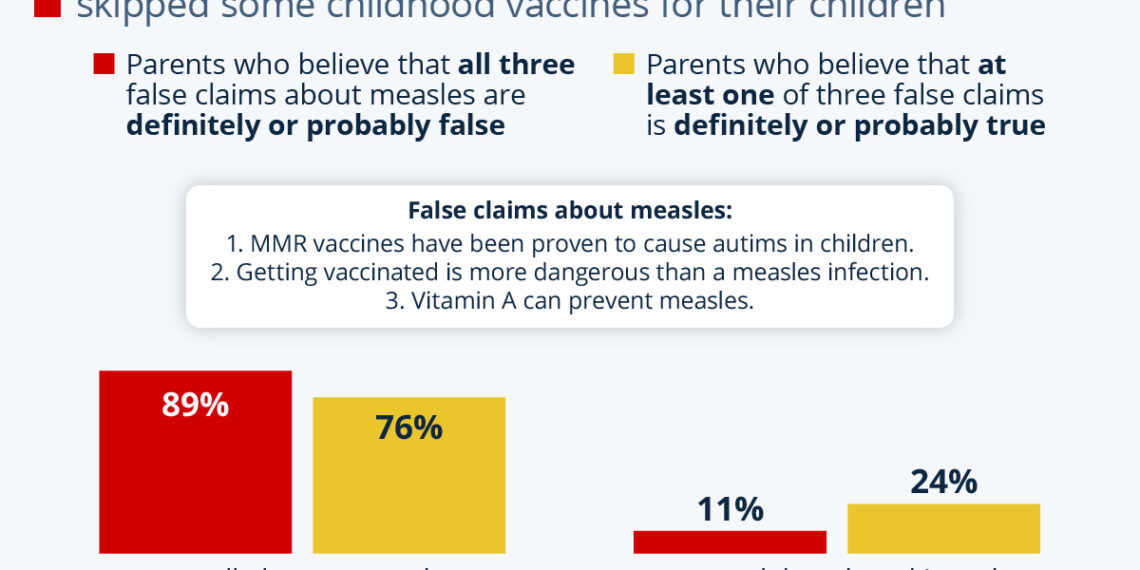Select Language:
Understanding Vaccine Misinformation and Its Impact on Childhood Vaccination Rates
The Landscape of Vaccine Skepticism
In recent years, a considerable amount of misinformation surrounding vaccinations has proliferated, significantly affecting parental perceptions of vaccine safety. At the forefront of this unsettling trend is a notable lack of trust in health authorities, exacerbated by the presence of individuals with vaccine skepticism in prominent public health positions. This climate of doubt prompts parents to reassess the necessity and safety of vaccines for their children.
The Role of Online Misinformation
The internet has become a breeding ground for the spread of false information regarding vaccines. Social media platforms and blogs often promote unfounded claims about vaccination risks, which can sow seeds of doubt among well-meaning parents. This misinformation can create a sense of uncertainty about established medical practices, challenging the scientific consensus on vaccination safety and efficacy.
KFF Survey Findings
A recent survey conducted by the Kaiser Family Foundation (KFF) in April 2025 sheds light on the implications of this misinformation. The study found a strong correlation between parental beliefs in vaccine-related myths and the likelihood of delaying or skipping childhood vaccinations. Specifically, parents who subscribed to at least one false claim regarding the measles vaccine were significantly more inclined to deviate from vaccination schedules for their children.
Statistical Insights
- Parents who firmly believed that all three of the common misconceptions about the measles vaccine were false reported that only 11% had delayed or omitted vaccinations for their children.
- Conversely, an alarming 24% of parents who thought at least one of the misinformation claims was probably true admitted to missing recommended vaccines.
These statistics highlight a critical link between misinformation acceptance and poorer vaccination practices, underlining the potential risks posed by prevalent myths regarding vaccine safety.
Health Consequences of Vaccine Hesitancy
The ramifications of declining vaccination rates are dire. The World Health Organization (WHO) reports that over 100,000 individuals, predominantly children under five, lost their lives to measles in recent years. This staggering statistic is considered "unacceptable" given the availability of effective and affordable vaccines.
The Importance of the Measles Vaccine
The measles vaccine has historically played a pivotal role in global public health, credited with saving more lives than any other vaccination over the last half-century. WHO Director-General Dr. Tedros Adhanom Ghebreyesus has emphasized the critical nature of vaccination: “Measles vaccine has saved more lives than any other vaccine in the past 50 years.” This statement reflects the vaccine’s foundational role in protecting high-risk populations and underscores the urgency of combating misinformation.
Strategies to Combat Misinformation
Addressing the issue of vaccine misinformation requires a concerted effort from healthcare professionals, educators, and policymakers. Initiatives to enhance public awareness and improve access to reliable information about vaccines can play a crucial role in reversing the trend of vaccine hesitancy.
Educational Campaigns
Effective educational campaigns aimed at clarifying vaccine misconceptions can help bridge the knowledge gap. These campaigns should focus on:
- Evidence-based facts about vaccine safety.
- The benefits of vaccination for both individual health and community immunity.
- Real-life testimonials from healthcare providers and families who have benefited from vaccinations.
Engaging Trusted Voices
Engaging trusted community figures, such as pediatricians, teachers, and local leaders, can enhance the credibility of vaccine messaging. When respected individuals advocate for vaccinations and share factual information, they can counteract the pervasive influence of misinformation.
The Role of Healthcare Providers
Healthcare providers are on the frontline in the fight against vaccine misinformation. They possess the educational background and the authority to address parental concerns, disseminate factual information, and encourage adherence to vaccination schedules. By fostering open dialogues with parents and addressing their fears with empathy and understanding, healthcare professionals can help dispel myths and build trust in vaccines.
Conclusion
By being proactive in addressing vaccine misinformation, we can safeguard public health and ensure that future generations benefit from the life-saving power of vaccinations. With comprehensive education initiatives and the support of healthcare professionals, we can help parents make informed choices for their children’s health.







